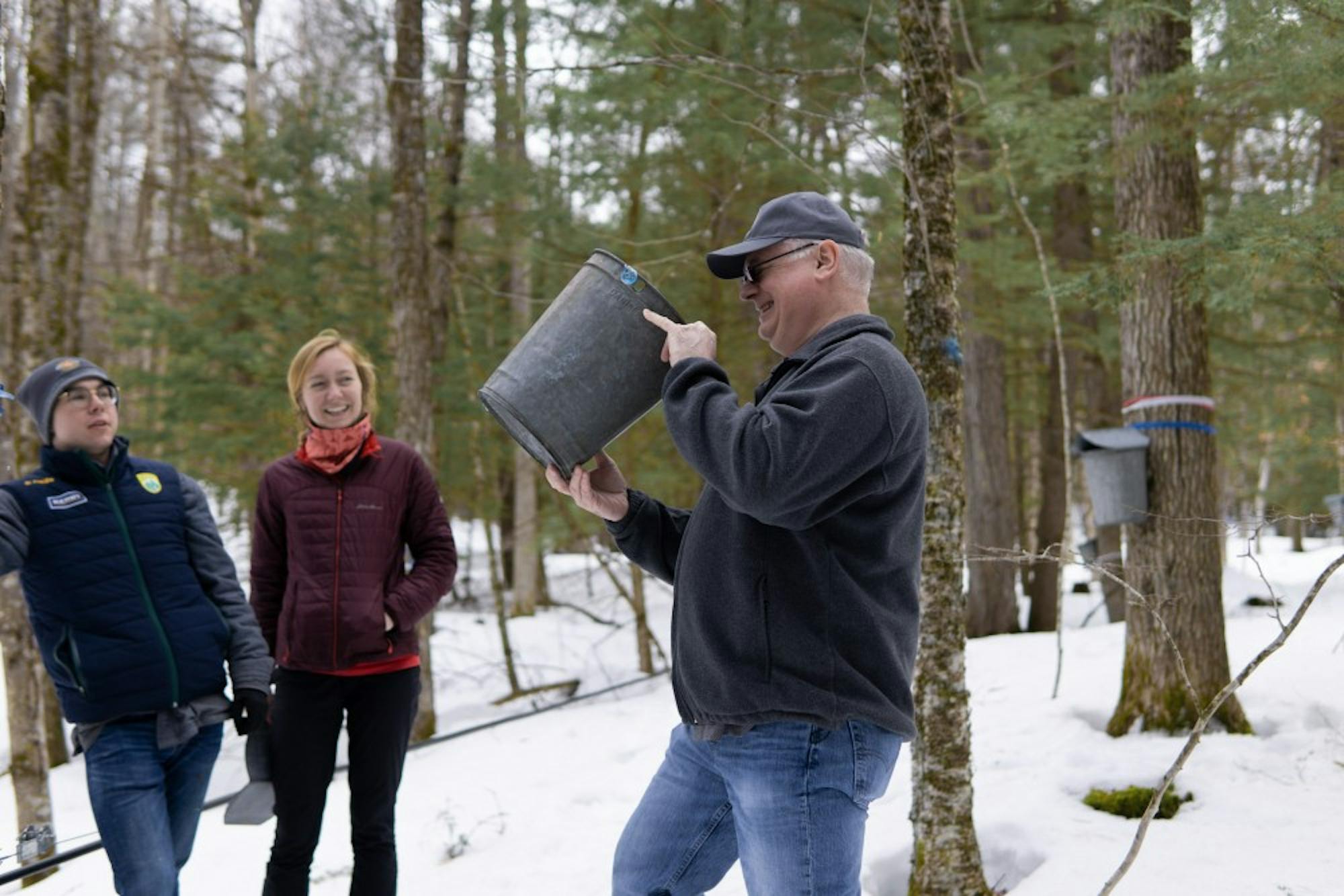Everyone loves maple syrup, right? That delicious, teeth-rotting liquid amber you can use to drench pancakes, waffles and (controversially) bacon in an attempt to make your heart stop faster? New Hampshire –– and more famously, Vermont –– is known for the production of maple syrup. Starch stored in sugar maple trees during winter months is converted back into liquid sugar as spring approaches. Ground water plus sugar equals sap, which is then “tapped” by inserting a spigot into the trunk of the tree and drained into buckets. Clear sap is then boiled at extremely high temperatures, giving the final product its signature color and viscosity. The process of production itself seems pretty simple. I wouldn’t quote me on that, though, because I’ve never done it. But a select few at Dartmouth have.
Sugar Crew is a small contingent of students who embark on an experiential journey through the New Hampshire sugaring scene. Nine to 12 students, including three student leaders, spend their spring break in Hanover tapping trees and boiling sap. While on campus during the term, they take educational field trips to learn about a part of our environment we rarely get to see. However, the intensive sugaring experience does not begin merely when winter term ends. The tireless crew works at the Dartmouth Organic Farm weeks in advance and continues even after students return for the spring. Preparation for sugaring takes about four hours during the last weeks leading up to spring break. A typical day in Sugar Crew over spring break begins with a meeting at the Sustainable Living Center, where the crew prepares a home-cooked meal before starting work for the day. The students then depart campus for the Organic Farm, where they spend hours sugaring before returning to Hanover, according to one of this year’s captains, Michelle Wang ’21. After returning as a Sugar Crew leader after freshman year, Wang emphasized the uniqueness of the sugaring experience.
“The goal is for students to engage with this area — New Hampshire, Vermont, the Upper Valley — and to engage with the culture of sugaring. And also to learn a little bit about different perspectives and sustainability through the lens of sugaring in this area,” Wang said. “We make maple syrup, [but the goal is] to get people thinking and working and getting outside.”
Wang, who is from California, explained that spring break this year was too short for her to make a trip home, which made sugaring an appealing alternative. Katie Shi ’21, from Texas, echoed this sentiment.
“I didn’t really want to fly back,” said Shi, who was new to Sugar Crew this year. “I was looking for fun things to do over break.”
Logistics are not the only reason people join Sugar Crew. Sugaring attracts “the most random people from the weirdest corners of campus,” according to Wang. She said that this year, Sugar Crew had two students from the fencing team, as well as a public policy minor — people who aren’t usually involved in sustainability.
“People come from all over, united by a cool program that lets you stay here for a week and gives you something to do over interim,” Wang said.
Part of the experience of Sugar Crew involves visiting “sugar bushes” (groupings of maple trees), industrial maple farms, maple research centers and the homes of sustainability activists.
“We do all of these field trips in an attempt to understand this place and its people, which we don’t get to do during the school year because you’re very much in your bubble,” Wang said.
Physical ability is not a barrier for those interested in taking part in the production of maple syrup. Shi notes that this year’s Sugar Crew was not dominated by people from the Northeast, and that no one — barring the captains — had any prior experience. Students are not expected to have prior experiences or any physical ability besides being able to walk from tree to tree.
“Sugar Crew has been a really awesome organic experience,” Shi said. “You really leave behind any affiliations or conceptions and get to know people.”
Lizzie Thoni ’21 also said that her first foray into sugaring this past break gave her greater insight into life outside of campus. Seeking a unique spring break experience, Thoni didn’t have any prior sugaring knowledge before joining Sugar Crew.
“I thought it was interesting to become immersed in [sugaring] culture, because everyone does it,” Thoni said. “Stepping outside of Dartmouth’s campus, you’ll see that every family has its own little mini sugaring operation. People are really psyched about their maple syrup.”
Thoni called her Sugar Crew experience “quirky” and “wholesome” and said it altered the way she sees life at school.
“At Dartmouth there are different circles of people. They’re big circles, but you only interact with those same people that you see at certain social spaces,” she said. “[With] Sugar Crew, I had the chance to interact with a whole other side of Dartmouth that I wouldn’t have before.”
Where does all of this hard work end up? The answer: bottled and sold. You can actually buy Sugar Crew’s maple syrup. Though they don’t produce on a commercial scale, they do sell small amounts at sustainability events, so keep an eye out. But wherever the maple syrup ends up, the true products of Sugar Crew are the relationships people forge: with each other, with the environment and with Dartmouth’s surrounding community. It’s hard to leave the Dartmouth bubble. We get stuck in our very comfortable schedules and tend to like it that way. Maybe sugaring is the incentive we need to break our routine and be a little sweeter to each other, both off and on campus.




